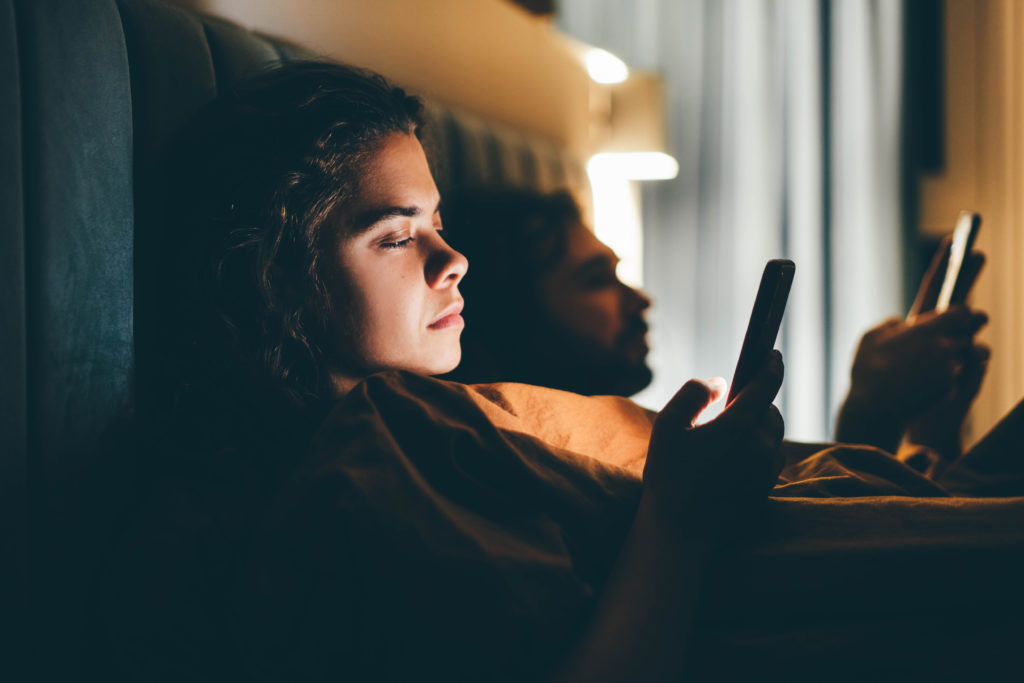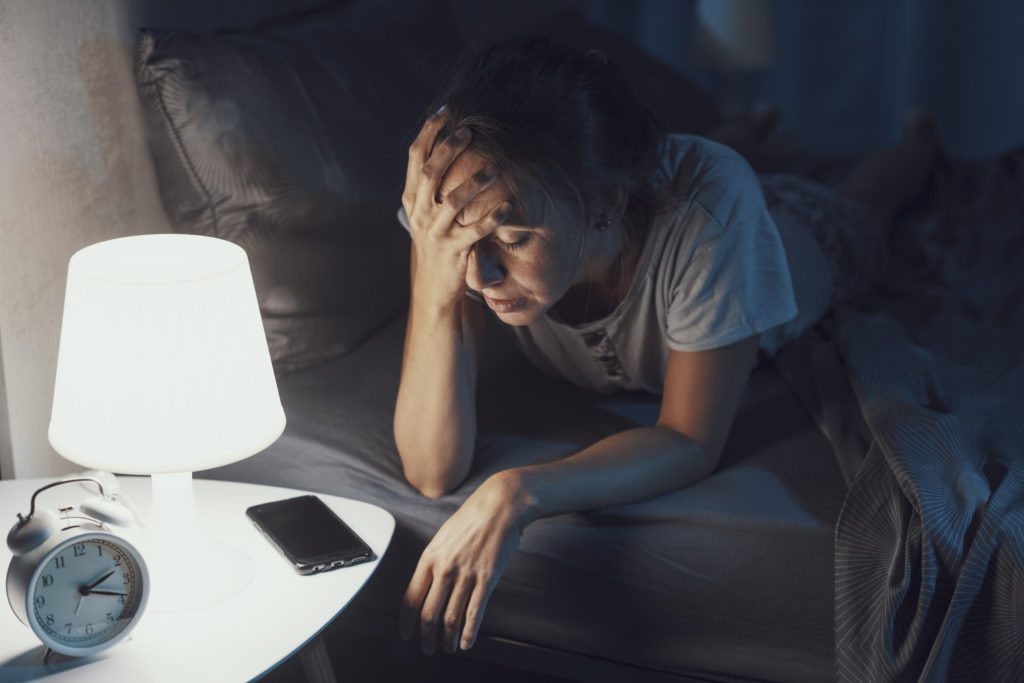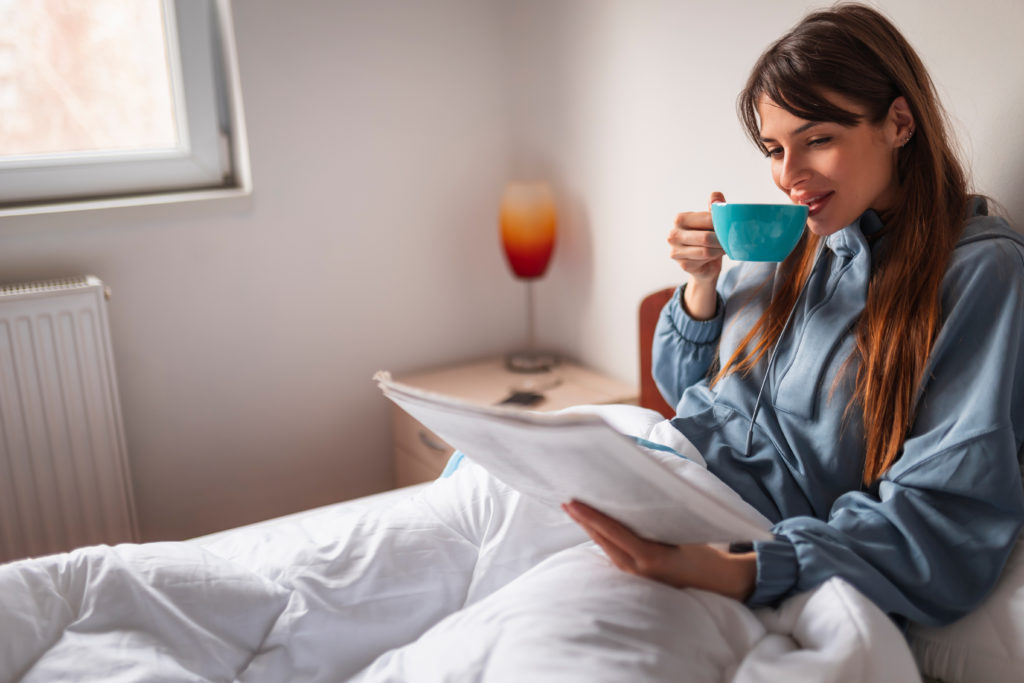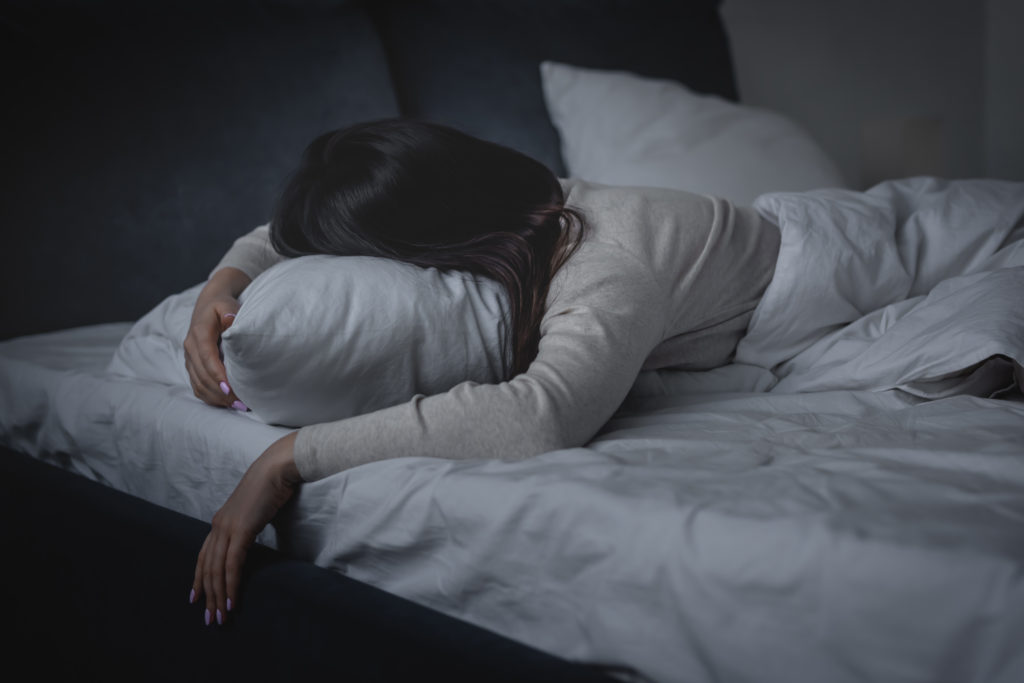We’ve all had nights like these— you toss and turn, unable to sleep for hours and before you know it, you can hear the birds outside mocking you as the sun shines through your window. You stretch, yawn, and sigh— another sleepless night.
There’s no debate that a good night’s sleep is essential to your overall health and well-being. Getting enough healthy sleep can help protect your physical health, your mental health, your quality of life, and even your safety.
During sleep, your body performs a number of vital restorative functions, from repairing blood vessels to fighting off infections to preparing your brain for the day ahead.
Most adults need between 7-9 hours of sleep each night for optimal brain performance and physical health, yet few sleep the required 7-9 hours for optimal health.
If you’re among the sleep deprived, there are many reasons why you may have trouble sleeping at night.
One of the most common causes of poor sleep is insomnia— but what causes insomnia? There are many factors contributing to sleep issues like insomnia. But first, what defines insomnia versus occasional sleep deprivation?
What is Insomnia?
Insomnia is a common sleep disorder characterized by difficulty in falling asleep, staying asleep, or both. There are two main types of insomnia:
- Short-term insomnia: Also known as acute insomnia, this kind of insomnia lasts for less than three months and normally goes away on its own.
- Chronic insomnia: This kind of insomnia occurs when you have difficulty sleeping for at least three nights each week for three months or more.
Common Effects of Insomnia
Even if you normally sleep well, everyone has experienced insomnia symptoms at some point in their lives. The most common effects insomnia has on your body include:
- Daytime sleepiness or fatigue
- Brain fog, or difficulty focusing or concentrating
- Memory problems
- Irritability
What Causes Insomnia?
Insomnia can be caused by a number of factors— insomnia that isn’t caused by other health problems is called primary insomnia, while insomnia caused by another health condition is called secondary insomnia.
Acute insomnia is most often caused by stressful life events, such as becoming a new parent or a demanding job, but it can also be caused by hormonal factors as well, such as pregnancy and menopause.
Chronic insomnia can also be caused by stressful life events, but it can also be connected to medical conditions like chronic pain, nightmares, and even certain lifestyle choices.
7 Common Causes of Poor Sleep
The potential causes of insomnia can be easy to overlook, and may even come as a surprise. Here are 7 common causes of insomnia and poor sleep, and effective methods to treat each of them.
1. Poor Sleep Habits
Proper hygiene is just as important when it comes to sleep as it is in other areas of your life. Good sleep habits contribute to a good night’s sleep, while poor sleep habits contribute to poor sleep.
Many of your favorite activities before bedtime— and even some from during your day— can disrupt your sleep cycle and make it harder to get the healthy sleep you need.
For example, taking a mid-afternoon nap can help you finish your day strong, but an evening snooze can leave you wide awake in the middle of the night.
This causes your circadian rhythm to fall out of alignment, which can prevent you from feeling tired and ready to sleep at your normal bedtime. To avoid this, make sure not to nap after 1:00 PM, but if you must sleep in the afternoon, try to make it no longer than 30 minutes. If you can power through your fatigue until your normal bedtime, your body will show thanks with a heavy slumber and a well-rested tomorrow.
Another bad sleep habit is using your electronic devices right before bedtime. Devices like smartphones, laptops, tablets, and TVs have become important fixtures in our lives, but the blue light they emit can hinder your body’s natural melatonin production, delaying your rest.
Your body naturally produces more melatonin as you get ready for bed each night. And when the sun rises each morning, your body produces less melatonin to help you wake up and greet the day. This natural melatonin production can be easily thrown off by too much artificial blue light, but avoiding this is much easier than you may expect.
To avoid the negative effects of blue light on your sleep, be sure to avoid using your devices 60-90 minutes before your normal bedtime. If you must use your devices before bed though, you can also use blue light blocking glasses and screen protectors, like the ones from Occushield or SwanWick, to reduce how much light you are exposed to.
Habits aren’t just important practices to keep us in line, habitual training also has a lasting impact on our subconscious One other thing to consider is that your bed should be for sleeping and sex only. If you use your bed for doing work, studying, or engaging in hobbies, your mind will start to associate your bed with being awake rather than sleeping. So unless you are planning on sleeping or having a little extracurricular fun, make sure you stay out of bed!
2. Eating at Bedtime
If you work long hours or have an irregular schedule, you may find it hard to resist the urge to eat a full meal when you get home.
However, if this is too close to your bedtime, that can cause some problems down the line. If you eat too close to your bedtime, your body will be busy digesting your meal when it should be helping you sleep! Instead, make sure to finish eating at least a few hours before you plan on going to bed to give your body plenty of time to digest.
If you do need to eat closer to bedtime, for example, if you have type I diabetes or have glycogen storage disease, a study by the journal Nutrients has found that a small, nutrient-dense snack before bed may also provide some health benefits.
Be sure to avoid spicy foods before bed too. Eating spicy foods before bedtime may cause heartburn and acid reflux, further disrupting sleep and causing discomfort.
3. Heartburn and GERD
A common medical condition called gastroesophageal reflux disease (GERD) can be associated with late-night eating and sleep problems. It can also cause painful heartburn, making it harder to sleep.
The good news is that GERD and heartburn are treatable. In some cases, making positive dietary changes can have a positive impact. In other instances, GERD can be caused by untreated obstructive sleep apnea.
Obstructive sleep apnea is a serious sleep disorder where, because of an obstructed airway, your breathing pauses or stops several times throughout the night.
With untreated sleep apnea, you have to create large negative pressures to bring air in through a very narrow space so that you can breathe while you sleep. Negative pressure in the chest forces positive pressure in the belly— resulting in stomach acid shooting upwards and into the chest and esophagus.
However, getting diagnosed and seeking treatment for untreated sleep apnea can not only reduce GERD and heartburn symptoms, but insomnia symptoms as well.
Related: GERD and Sleep Apnea: Treating OSA Helps Reduce Nighttime Reflux
4. Anxiety and Depression
Anxiety and depression are the two most commonly diagnosed mental disorders— and both can negatively affect your sleep in several ways.
Studies published by Dialogues in Clinical Neuroscience have found that 75 percent of people diagnosed with depression also experience insomnia as a core symptom. For people suffering from various forms of anxiety disorders, 24-36 percent also report co-occurring insomnia.
If you’re experiencing symptoms that disrupt your sleep as well as mental health problems, it’s important to speak to a medical professional, such as your primary care practitioner or specialist recommended by your doctor.
Getting proper treatment for your anxiety or depression can alleviate the symptoms associated with insomnia.
Your doctor or primary care physician can also rule out other conditions that may be contributing to insomnia or mental health disorders like hyperthyroidism— where the thyroid gland produces too much of a hormone, thyroxine, that regulates your metabolism.
Hyperthyroidism symptoms can mimic those of panic attacks, including a racing heart, night sweats, and anxiety.
Neurological conditions such as Parkinson’s Disease or multiple sclerosis (MS) can cause pain and muscle spasms, also contributing to insomnia symptoms and mental health problems.
If you have any of these conditions, a sleep specialist can coordinate with you and your doctor to address the causes of your insomnia.
5. Medications
While medication can be an important part of managing many chronic health conditions including depression and anxiety, some medications may have side effects that negatively impact your sleep quality, or can even cause insomnia. Among them include:
- Dopamine agonists, like those used to treat Restless Legs Syndrome and Parkinson’s Disease
- Stimulant medications, including some allergy medications, or painkillers containing caffeine
- Selective Serotonin Reuptake Inhibitors (SSRIs) including some antidepressants
Even prescription sleep aids can cause sleep problems by becoming less effective the more you use them, or even causing parasomnias or dangerous behaviors while you sleep. Even using a melatonin supplement can inhibit your body’s natural melatonin production down the line.
If you think any of your prescriptions may be preventing you from getting a good night’s sleep, talk to your doctor about changing your dosage schedule or even alternative prescriptions.
Never stop taking your prescriptions or take them at different times without your doctor’s permission.
6. Caffeine, Nicotine, and Alcohol
Coffee is often the go-to beverage for when you’re tired and need a boost during the day. However, caffeinated beverages like coffee and tea may keep you awake at night if you drink them in the evening.
The caffeine in these drinks act as stimulants, and jump-starts your body, interfering with natural sleep cycles. Instead, try to avoid caffeine within 6 to 8 hours of bedtime. This may seem excessive, but this will ensure that all the caffeine is out of your system by the time you’re ready for bed.
Nicotine is as much of a stimulant as caffeine is. Not only that, but nicotine and smoking can cause inflammation in your airways, which can worsen snoring or sleep-disordered breathing like sleep apnea. The best way to avoid this is to avoid nicotine or to quit using it.
Alcohol is considered the world’s most commonly used sleep aid, and while alcohol can help you fall asleep, it does much more harm than good.
Alcohol disrupts REM sleep, so even though your eyes may be shut, you’re not getting the good quality sleep you need to feel rested in the morning.
Alcohol can also cause or worsen snoring or sleep apnea symptoms, and contribute to additional sleep disorders.
7. Other Sleep Disorders
Insomnia is a common sleep disorder, but it’s not the only one out there you need to worry about. Sleep apnea, for example, can cause you to stop breathing during the night, as well as cause you to loudly snore because of your obstructed airways.
Sleep apnea can be treated by a mask that fits over your mouth or soft nasal cushions to help you breathe while you sleep— this is called continuous positive airway pressure therapy, or CPAP therapy.
If you have sleep apnea and insomnia, treating sleep apnea can often resolve the issue as it works to eliminate the root cause of restlessness.
Other sleep disorders that can contribute to or worsen insomnia include:
- Restless legs syndrome
- Circadian rhythm disorders
- Parasomnias, or abnormal sleep behavior like sleepwalking or nightmares
If you think another underlying sleep disorder may be causing your insomnia, contact your doctor or a sleep expert.
If You Struggle with Poor Sleep, Seek Help
A good night’s sleep is vital to your physical and mental health. If you’re not getting enough healthy sleep each night, you may be putting yourself and others at risk during the day. Insomnia does not have to control your life— you deserve a good night’s rest, each and every night, and your body relies on it to be effective throughout the day
But if healthy lifestyle changes don’t resolve your insomnia, it’s important to seek additional treatment.
Contact us at the Sleep Centers of Middle Tennessee today if you feel your insomnia may be the result of an additional sleep disorder, like obstructive sleep apnea. We can help you schedule an evaluation and find the right treatment for you, so you can return to getting the restorative rest you need each night.
References
Kinsey, Amber W, and Michael J Ormsbee. “The Health Impact of Nighttime Eating: Old and New Perspectives.” Nutrients, MDPI, 9 Apr. 2015, www.ncbi.nlm.nih.gov/pmc/articles/pmc4425165/.
Nutt, David, et al. “Sleep Disorders as Core Symptoms of Depression.” Dialogues in Clinical Neuroscience, Les Laboratoires Servier, 2008, www.ncbi.nlm.nih.gov/pmc/articles/PMC3181883/.
Staner, Luc. “Sleep and Anxiety Disorders.” Dialogues in Clinical Neuroscience, Les Laboratoires Servier, Sept. 2003, www.ncbi.nlm.nih.gov/pmc/articles/PMC3181635/.
Breus, Michael J. “Alcohol and Sleep: What You Need to Know | Psychology Today.” Psychology Today, 11 Jan. 2018, www.psychologytoday.com/us/blog/sleep-newzzz/201801/alcohol-and-sleep-what-you-need-know.






